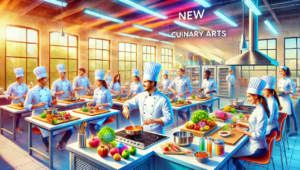Will partner with Mountain Institute Career and Technical Education District (MICTED) after plans for a $1.5 million facility to be located at Chino Valley Center were quashed last March; unclear if project received public approval by Governing Board
 Yavapai Community College is moving forward, apparently with MICTED sharing in the cost (although not entirely clear), in construction of a new culinary training facility on its Prescott Campus. This new project involves a major renovation of a portion of Building 4 and is expected to take six months. Demolition and construction were anticipated to begin in mid-July, 2024.
Yavapai Community College is moving forward, apparently with MICTED sharing in the cost (although not entirely clear), in construction of a new culinary training facility on its Prescott Campus. This new project involves a major renovation of a portion of Building 4 and is expected to take six months. Demolition and construction were anticipated to begin in mid-July, 2024.
Recall, that the Community College and the Mountain Institute Career and Technical Education District (MICTED) had much earlier this year decided to collaborate on establishing a culinary training facility at the College’s Chino Valley Center. This initiative was said to be inspired by the success of the existing training program at Prescott High School, which operates under the auspices of the Mountain Institute.
The proposed Chino Valley facility, estimated to cost around $1.5 million, was to be jointly financed, with each partner contributing $750,000. Construction was set to begin immediately following approval by the District Governing Board at its May 2024 meeting.
However, unexpectedly, the College announced in the March 2024 Facilities Management Newsletter that the “MICTED/YC Culinary project was canceled for the Chino Valley Agribusiness Center.” No explanation was provided, and the College mentioned that options were being reviewed to potentially house this program at another YC campus or center.
The new culinary training facility on the Prescott Campus was not included in the College’s most recent Master Plan and the joint costs to be shared, if any, have not been made public. Moreover, the approval status of the project by the District Governing Board remains unclear. However, since it is technically classified by the College as a “renovation” rather than a new capital expenditure, College leadership may believe that formal public Board approval is unnecessary. The tactic of not publicly discussing such projects and obtaining public input prior to construction potentially keeps them out of the public eye and prevents taxpayers from asking questions about them until after they are completed.

